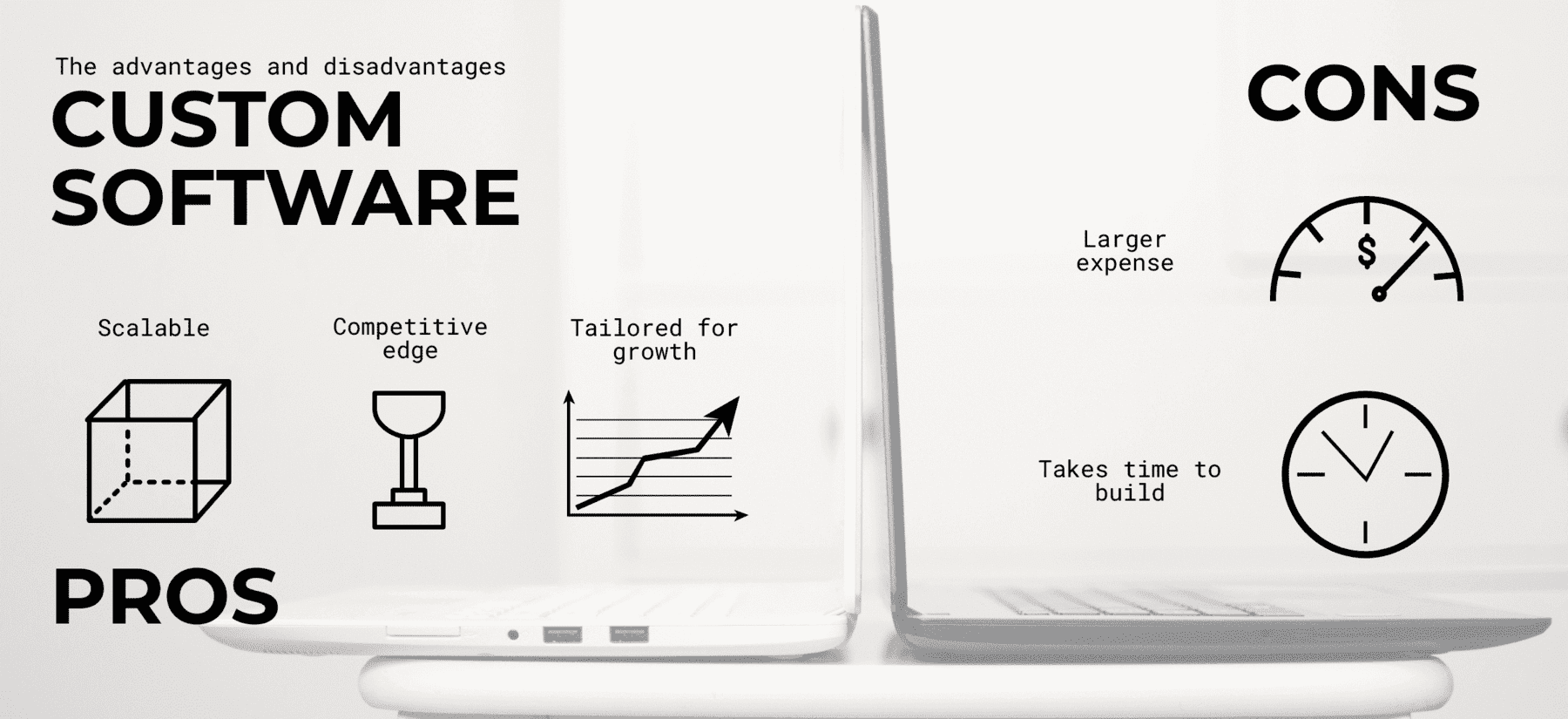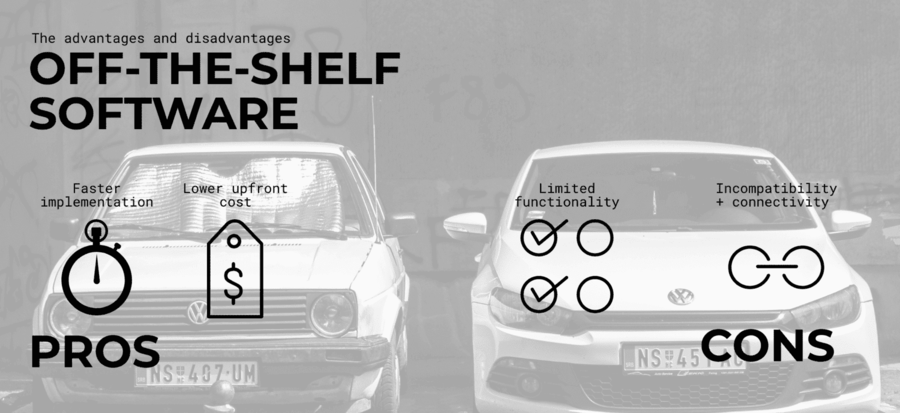Custom vs. Off-the-shelf Software: It Comes Down to Cost vs. Control

As Shakespeare once said, to build or not to build, that is the question. Technically, it was not exactly what he said. But being applied to the process of building an application these words are much more than true. The thing is, one has always to decide, which strategy to follow, to create an app from scratch or build one. This dilemma and the way it is solved is the turning point for any business owner.
Each approach has its benefits and drawbacks and the question of which one to choose can be solved in different ways depending on the business needs and constraints.
To make the right decision and pick the best strategy for your particular project, try to answer the following questions.
- Is your business large or small? If large, how much is it?
- Are you about to burst its growth anytime soon?
- Is the business structure supposed to evolve with time?
- What does the success of your project depend on? Will there be some sophisticated technology used?
- What are the timeframes you are working within?
- What is the budget for the project? Can it handle additional feature implementations?
The article is dedicated to the main pros and cons of “off-the-shelf” apps as well as custom software solutions. We will use the questions, mentioned above, to figure out which strategy will be the best under certain circumstances for your business.
There will also be highlighted the most common misconceptions, related to building and buying software. This section is important because these misconceptions can lead to substantial money loss if the decision will be the wrong one.
The case for custom software
Build vs. buy: scalability
First, if you are about to build a huge product with substantial growth over time, a custom software solution is the thing you need. The apps of this kind can be easily modified in a short time. In other words, these apps are more flexible and can change according to the needs of your business. Perhaps you will find a working piece of technology, corresponding to your needs at the moment. With time, as your project grows and changes, the ability of the app to meet the growing business needs will diminish pretty fast.
In time you will face the urge to move to some other technology, to modify the existing one(remember, in most cases, it is not that flexible to be changed easily). In other words, this switch to a new system will cause more problems and is risky on its own because, during the time you are processing the shift, the app does not work as expected and the profit becomes lower. On the contrary, small incremental changes and alterations are flexible enough so the app in general works smoothly.
This competitive, competitive world
Technology is the king. And cutting-edge technology rules the world. If the business starts with an off-the-shelf solution, the risk to get outdated technology is way too high. It is not just an additional headache for the developers in case the app will require to be modified. It is about losing the opportunity to be ahead of the game in the industry because new technologies meet the needs of the modern world much better. With a custom software solution, it is not an issue at all because cutting-edge technology is used from the very beginning, allowing you to get a significant competitive advantage.
Leveraging IoT-based solutions and developing smart product technology can become a game-changer, making real wonders. Thus the business becomes more productive, efficient, and enticing to the customers. Last, but not least, the advantage is that it is easier to stand out from the competitors with custom software.
Faster growth
Customization, capability, scalability… it’s cool, of course. But along with these amazing points in the case of custom software comes another one – faster and better results. The only condition under which your business can experience a really smooth workflow and be like a well-oiled machine is if the app has all the needed functionality in the way the business requires it. It means that the software, which is created and optimized for your specific needs and the needs of today’s world, and the customers’ requirements and expectations, will push production and increase the overall profit, leading to exponentially faster growth.

Are there any drawbacks at all?
The price
The first and the most commonly mentioned drawback of custom software is the price. It can become a deal-breaker, depending on the size of your business and the functionality of the app to be implemented. One should be sure that the income he gets from the app covers the expenses related to building and maintaining the app itself.
Read also: Evaluating Your Budget: How Much Does It Cost to Develop an App?
But there’s a misconception one should be aware of. The off-the-shelf apps are not 100% the most financially sound options. At the very beginning, it can seem like that but over time it can lead to loss of revenue, exceeding the additional costs, related to maintaining and even building custom software. The reason is simple. The employees will have to compensate for not having all the needed features, sacrificing sales and their work responsibilities. In other words, this “compensating activity” leads to direct monetary losses.
Time to build
When the software development process is organized properly, the client gets usable chinks of the needed software in a timely manner. But if you want to launch a complete software at once, keep in mind that it takes substantial time. So ask yourself, if you really have this time to get it all in once or timely manner is still a better option.
Off-the-shelf software: the good, the bad, and the ugly
The question of what to choose, a custom software or an off-the-shelf one can be asked in another way. What you would like to choose: long term or short term? Let’s have a look at the short-term benefits.

Lower upfront cost
In case the main concern is the budget and the potential cost of the software, if the resources are limited, it will be better to choose a pre-built piece of software. They are cheaper to buy as well as to implement. So yes, here the price rules. But keep in mind that there might(well, in most cases will) additional financial drawbacks appear over time. Also as your project grows and becomes more and more complex, you may decide to move to custom software from the pre-built one.
Faster implementation
Off-the-shelves apps can be implemented and start working faster than custom pieces of software, required building from the scratch. But keep in mind that it is just a myth that implementing an off-the-shelf app does not require a team of developers. Yes, they are called ‘off-the-shelf”, but they are not the ones that can be used at once. In other words, off-the-shelf does not mean plug-and-go, not even close. To implement and make such a solution work the development team needs to spend some time and effort.
Limited functionality
The functionality and capabilities of the pre-built software are rigid. There’s little room for customization, so in case the business needs some unique requirements or needs to be accommodated for the changing rules in the industry, one can face unexpected difficulties, not telling about the money lost. Thus the business will experience all the disadvantages at once. The software with limited functionality will not have a single chance to show better performance and compete with the rivals, who chose to use custom software from the very beginning.
Incompatibility & connectivity issues
But limited functionality and lack of flexibility are not the only issues the business owner faces, choosing pre-built software. It can be simply incompatible with the software and devices the customers use today. However, it can turn out to be incompatible with the new software to be implemented later on.
Custom software is more flexible and is created with compatibility in mind. It can be connected to other devices and pieces of software if needed. In other words, if there will be needed some functionality to be implemented with time, it can be achieved easily.
To cut a long story short, taking a decision which kind of the app to choose the business owners answers, generally, just one question – what is the priority, to launch fast and cheap and keep in mind all the potential drawbacks or to invest in the long-term perspective
If you have any questions or want to know more details regarding what kind of software to choose, drop us a line and get a free consultation with our experts.